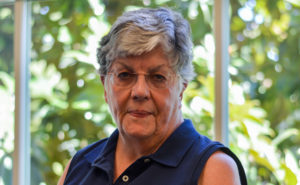
Kirsten Fischer-Lindahl, Ph.D., recently joined The Heritage Society through the establishment of a generous charitable gift annuity at Southwestern Medical Foundation. Her gift will benefit the Office of Women’s Careers at UT Southwestern Medical Center providing support for female faculty.
I’m hoping this will be put to good use. The Office of Women’s Careers helps young women starting out in their careers, offering useful guidance, such as how to write successful grant proposals.
Dr. Fischer-Lindahl
An American citizen since 2001, Dr. Fischer-Lindahl was born and raised on the Danish island of Bornholm in the Baltic Sea. Both her parents were professionals in medically related fields and inspired her to pursue natural sciences and research. She studied biochemistry at the University of Copenhagen in Denmark, graduating with a Master’s Degree. Soon afterwards, she received a scholarship from American Women’s Club, which supported her travel for graduate education in the United States. She enrolled at the University of Wisconsin in Madison and within two years, in 1975, received her Ph.D. in Immunobiology for research on the mechanisms of transplant rejection.
After postdoctoral studies at the University of Pennsylvania in Philadelphia, Dr. Fischer-Lindahl returned to Europe to continue her research, first in Cologne, Germany, supported by a fellowship from the European Molecular Biology Organization, and then in Basel, Switzerland, where she joined the Basel Institute for Immunology. As a member of this elite research institute, she developed a strong independent research program, using the tools of mouse genetics to elucidate the molecular and cellular biology of the major histocompatibility complex.
“At the time, immunology was a new and exciting field,” said Dr. Fischer-Lindahl, who focused her research on the cell surface proteins that serve to direct so-called “killer cells” of the immune system to recognize and destroy foreign, infected, or mutated cells.
Her successes in this field led to a 1985 invitation from UT Southwestern Medical Center (then known as The University of Texas Health Science Center at Dallas) to join the new branch of the Howard Hughes Medical Institute as well as the senior faculty of the Microbiology and Biochemistry Departments. Investigations by Dr. Fischer-Lindahl and her colleagues in Dallas culminated with the molecular structure of a major histocompatibility protein of an unusual type that affords early protection against bacterial infection. In later years, Dr. Fischer-Lindahl used genomics and molecular biology to characterize other major histocompatibility genes that play various roles in immune defense.
In addition to her research, Dr. Fischer-Lindahl mentored numerous students and postdoctoral fellows, who came to dread her red editing pen. Several of them followed in her footsteps and currently hold independent faculty positions in various academic institutions. She continues to be an inspiration for her colleagues, peers, and collaborators whose research intersected with Dr. Fischer-Lindahl’s scientific inquiries.
Dr. Fischer-Lindahl retired from the UT Southwestern faculty in 2003. She now divides her time between Dallas and Jackson, Wyoming, together with her husband, the 1988 Nobel Laureate in Chemistry, Dr. Johann Deisenhofer, whom she married in 1989. Both had been recruited by the late Dr. Joseph Sambrook, then chairman of the UT Southwestern Biochemistry Department. Dr. Sambrook’s leadership and support meant a great deal to Dr. Fischer-Lindahl, and she initiated efforts to raise funds for an endowed gift to honor his legacy when he passed away in June 2019 at the age of 80.
I have been inspired by Dr. Kirsten Fischer-Lindahl since I arrived at Southwestern Medical Foundation. She has contributed greatly to the advancement of science and the advancement of women. She is generously encouraging women’s careers in every way possible as a role model, mentor, and financial supporter. Dr. Fischer-Lindahl has had tremendous impact throughout her career and continues a great legacy supporting other women’s advancement. What a great investment this is in our future.
Kathleen M. Gibson, President and CEO, Southwestern Medical Foundation
In 2019, Dr. Kirsten Fischer-Lindahl also contributed funds to the American Women’s Club in Denmark—the organization that helped her many years earlier—supporting their scholarship program for Danish women who want to study in the United States. When it comes to giving back and finding inspiration to invest in one’s own community, Dr. Fischer-Lindahl believes that it all comes down to values:
It’s my wish that these funds help create new programs that benefit women. Women so often get stuck in the middle of their careers and don’t move into higher-level roles. Perhaps this can make a difference for some.
Dr. Fischer-Lindahl
Dr. Fischer-Lindahl’s gift vehicle, the charitable gift annuity (CGA), is a contract between a donor and a charitable organization. The donation is invested and a percentage is paid out each year to the donor (or a designee). Each payment is fixed and the amount of the payment is determined by the age of the person who receives the benefits. After all payments have been made, the charitable organization receives the remaining value of the gift in support of the causes designated by the donor.
To learn more about Charitable Gift Annuities, go to swmedical.org/cga or you may contact Randal Daugherty, Director of Planned Giving, UT Southwestern Medical Center at (214) 648-3069 or randal.daugherty@utsouthwestern.edu.
Read more of our 2020 Planning Matters Spring series:
Dr. and Mrs. William W. Turner Jr.
A Message from our President and CEO
Save Taxes and Support Your Charity with Your Retirement Assets
Request Your Complimentary Planning with Retirement Assets Booklet